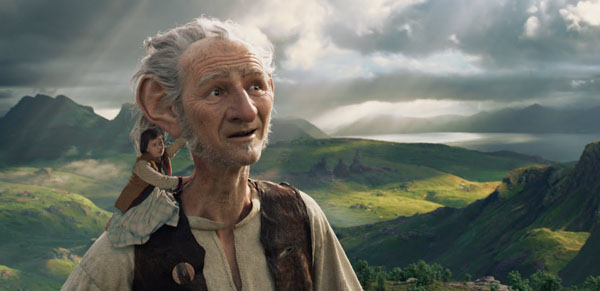
Josh Reviews The BFG
I adored the work of Roald Dahl as a kid, and The BFG was in heavy rotation for me for many years. The idea of a movie adaptation of that terrific book was exciting, and that it would be helmed by Steven Spielberg — probably the greatest director working today — was even more tantalizing.
And so I was somewhat surprised that this big-screen version of The BFG left me rather underwhelmed. This feels to me like a minor work from Mr. Spielberg. It’s not head-poundingly frustrating like The Lost World or A.I.: Artificial Intelligence. Rather, it’s just that the film feels very slight. There are moments of greatness, but over-all I found The BFG to be somewhat boring. I don’t think I’ve ever before felt that way about a Steven Spielberg film.
Although Mr. Spielberg has made many movies that feature children, and that are about childhood, it could be that this is the first Spielberg movie that is aimed so squarely at children in the audience. I can imagine kids being thrilled by the film, but for me as an adult I found it very simplistic, without too much to capture my interest. There are some lovely ideas in the film and some beautiful sequences (certainly the dream-catching sequence alone, in which the BFG takes Sophie to the underwater/underground magical realm in which one can chase and catch dreams as one would fireflies, is magnificent), but the story moves along without too much depth of character or too many surprises. What played as a fantastical left-hand turn into craziness in Mr. Dahl’s original book — in which Sophie decides to elicit the help of the Queen of England to help her and the BFG solve their problems — plays in the movie like an amusing but almost distracting digression from the main story.
I was so excited that this adaptation of The BFG represented the final collaboration between Mr. Spielberg and the late, great Melissa Mathison (who wrote E.T.), and so I’m sad to report that I wasn’t as delighted as I’d expected to be by the film’s script.
The one time I was truly moved by the film was in the final moments. In that bittersweet ending the film finally hit, for me, the emotions that I felt it had been striving for the whole time. I wish there had been a little more of that emotional resonance in everything that had come before.
Ruby Barnhill, who plays young Sophie, the orphan girl who discovers and befriends the BFG, is lovely in the film. She spends much of the film interacting with a CGI make-believe giant, and yet despite that she’s able to give a very effecting, realistic performance. She’s very endearing.
Mark Rylance, meanwhile, who portrays the BFG (enhanced by some spectacular CGI, more on that in a minute), is spectacular, and if there is a reason to see this film it is primarily to enjoy his gloriously full-bodied, heartfelt performance. He brings the BFG’s silly gibberish-speak to full-throated life, and I found his every utterance and malapropism to be a delight. Mr. Rylance also marvelously plays the BFG’s loneliness and melancholy. This is a very soulful character, something that is incredibly hard to pull off successfully, but Mr. Rylance hits this out of the park.
Bravo to Weta Digital (the main effects house behind Peter Jackson’s Lord of the Rings films) for their incredible work on the BFG. They’ve created a CGI giant that completely feels like the performance work of Mark Rylance. The design of his face in particular is a wonder — this is a totally fanciful creation and yet, at the same time, it still looks totally like Mark Rylance! I love how they were able to ensure that his performance would shine through the CGI effects. It’s fantastic work. (I found myself almost hypnotized at times by the waggling of the BFG’s humongous ears.) I also loved the work done on the other giants, particularly the head bully Fleshlumpeater. There are some close-ups of his face that are truly extraordinary.
If there’s one place where the CGI falls down a bit it’s with the incorporation of the live-action Ruby Barnhill as Sophie with the CGI enormous BFG. I found that there were some times in the film in which you’d see the BFG alone on-screen, perhaps in a close-up on his face, and I was 100% convinced by the reality of this creation. And then in the very next shot you’d see the BFG sharing the screen with Sophie, and suddenly the BFG looked a little fake to me.
Mr. Spielberg’s last film, the excellent (and very underrated) Bridge of Spies, was a rare Spielberg film for which John Williams did not provide the score. I was pleased to see Mr. Spielberg reunited with Mr. Williams here for The BFG, though I must confess that I didn’t find the score to be particularly memorable. Perhaps the score will stand out more when/if I ever see this movie again. But on a first viewing, there weren’t any major themes that stuck with me after watching the film.
I did enjoy the way the film managed to sneak one of Quentin Blake’s illustrations into the story. Mr. Blake illustrated many of Roald Dahl’s books, and I know I’m not the only reader for whom Mr. Blake’s work is inextricably bound to Mr. Dahl’s.
The BFG didn’t set my world on fire, but minor Spielberg is still very enjoyable. Mr. Spielberg was able to bring this fantasy world to life with such ease and grace that he makes it look effortless. Though I didn’t feel this film adaptation had quite the life or spark that Roald Dahl’s original book did, I still enjoyed it as a sweet, silly children’s fable.
